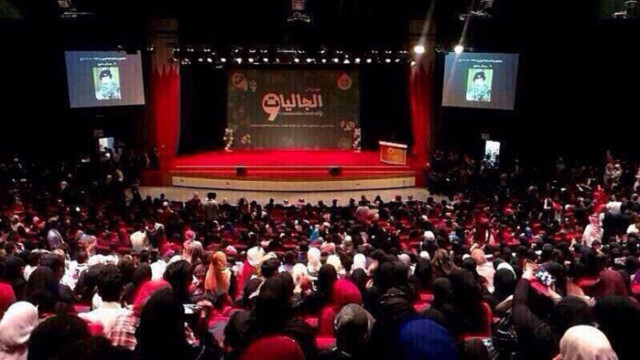
Manama: An international cultural diversity festival hosted by the University of Bahrain has waded into controversy after the Iraqi student community beamed the picture of former president Saddam Hussain during the screening of a documentary on Iraq’s history and civilisations.
Although there were no strong reactions from the students attending the festival aiming to spotlight the diversity of the university communities when the large picture of the former leader who was toppled in 2003 was displayed, overtones of criticism and sectarianism loomed large afterwards, mainly on social networks.
Some of those who opposed the Iraqi ex-president, who was hanged in the predawn hours of December 30, 2006 for crimes against humanity, labelled the event on Twitter as the “glorification of Saddam Husain” and accused the university of supporting sectarianism.
The event received particular attention in Kuwait, which Saddam invaded and occupied in 1990.
The university rejected the allegations and insisted that the festival was cultural, not political, and spotlighted activities by students from various nationalities.
“What was displayed at the festival was a purely student activity and was not generated by the administration of the university,” it said on its Twitter account.
“The festival is used by students to highlight the history, civilisations and political developments of their countries. The students from the Iraqi community displayed the history of all their presidents since the fall of the monarchy until today.
“The picture of former president Saddam Husain was displayed as part of the country’s political history. It was within a very specific context, but it seems that the picture display is being taken out of this context and given a different significance,” the university said.
Bahrain’s foreign minister refused both the glorification of Saddam and the exploitation of the event for sectarian purposes.
“Saddam is not one of us and whoever glorifies him is not one of us, either,” he posted on his Twitter account.
“Saddam killed our relatives and spoiled our lands in Kuwait. These are but sectarian projections.”
In another tweet, he added that “the memory of some people does not go beyond yesterday’s dinner.”
“Saddam occupied Kuwait and fired hundreds of missiles at Riyadh, Dammam and Bahrain. We do not glorify such people.”
He said that Saddam’s actions were a crime and that his foolishness has handed over Iraq to Iran, adding that “only people with weaknesses draw pride in this.”
Shaikh Khalid added that he regretted that “some people still worship and glorify idols.”
Osama Abdullah Al Jowder, the dean of student activities, dismissed claims about the glorification of Saddam Husain after a hashtag was launched on Twitter.
“Students at the university take part in the festival that celebrates the diversity of the communities,” he said.
“The picture of Saddam Husain appeared as the Iraqi students highlighted in a documentary they prepared the history and civilisations of their country since ancient times until modern days.
“The documentary was not confined to Saddam Husain or aimed to focus on him or any other single personality. The image of Saddam Husain was not displayed for a longer time than the other pictures and it did not have a caption or a comment that glorified him or gave him a special status,” he said.
Al Jowder said that the students were aware of the significance of the festival in highlighting cultural diversity and assisting them to gain insights into other countries and civilisations.
“It is unfortunate that some people took the display of Saddam’s picture out of its context to give it a different significance and a meaning that is not rooted in reality,” he said.
“We are keen at the University of Bahrain on cohesion between all students and on the special and outstanding bonds with our brothers and sisters in the other Gulf Cooperation Council [GCC] countries. No one should ever doubt this commitment,” he said.
Al Jowder said that the university made the decision to go through all the documentaries, films and programmes ahead of the next festival to ensure there are no misunderstandings or misinterpretations of the spirit of international celebrations.












